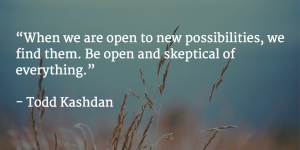1-Sentence-Summary: The Upside Of Your Dark Side takes a look at our darkest emotions, like anxiety or anger, and shows you there are real benefits that follow them and their underlying character traits, such as narcissism or psychopathy.
Read in: 4 minutes
Favorite quote from the author:

Audio Summary
Listen to the audio of this summary with a free reading.fm account*:
Noah Kagan recommended this book in his Creative Live class, so I instantly put it in my Blinkist library – and forgot about it. Reading about resistance yesterday, I thought I’d dive into bad feelings some more with this.
The Upside Of Your Dark Side explores what positive side effects our bad feelings and worst behaviors have, because there’s something good in everything. Instead of telling you how to avoid anger, guilt, and procrastination, it asks how those things add to our life. The surprising result is that they actually do and that it’s better to embrace rather than suppress them, if you want to live a whole life.
I learned these 3 things:
- Happiness can interfere with your performance.
- Guilt is good, shame is shit.
- Mindfulness takes a toll on you.
Here we go!
Lesson 1: Happiness can hurt your performance.
Yes, a work environment that boosts happiness, like at Google, is believed to make people better workers. However, there is a downside to it.
Happy people care less about details, which makes them less persuasive and prone to errors.
The summary quotes a study where happy and “unhappy” people had to write down arguments for or against certain political and philosophical issues. The reasoning of “unhappy” people was evaluated as 25% more convincing.
Similarly, happy people are more likely to recall false facts, or things they never even learned, because they’re focused on the big picture, for which details are less important.
Therefore, a happy person might be a better manager, who is responsible for the company strategy, but a less upbeat person will be a great head of quality management, where details are everything.
Lesson 2: Guilt is good, shame is shit.
One of the emotions this book takes a look at is guilt. There are 2 upsides to guilt:
- It’s a terrible feeling, so we avoid it at all costs, which leads us to commit less crimes.
- If we feel it, we do everything it takes to fix what we did wrong.
Research has shown that the more likely you are to feel guilt, the less likely you are to perform bad actions, like driving around drunk or stealing something.
Similarly, prisoners who felt a lot of guilt were less likely to re-offend once released.
Shame on the other hand is useless.
Why?
Opposed to guilt, shame doesn’t make you want to take responsibility. Shame makes you want to cover up your mistake.
So pay attention the next time you feel bad about doing something. If you want to throw the glass you broke right into the trash can and hope no one notices it, that’s shame. Try to take responsibility instead.
Lesson 3: Being mindful comes at a price.
Your ability to be mindful is limited. There is only so much data that your brain can process consciously. However, its capability to process information unconsciously is huge.
Think about how complex the task you’re doing right now is. You’re using your hands, senses, thousands of little actions come together, just so you can read this summary.
Imagine you had to consciously process and instruct all of these – mind-blowing, right?
Ergo, being mindful slows you down a lot. You have to take little baby steps to accomplish tasks, because you’re so busy with processing all the meta-information.
While being mindful is great for some tasks, meditation isn’t a cure-all.
There are 2 major advantages of practicing “mindlessness”.
- You make better decisions, because you trust your gut.
- You give your creativity room to unfold.
One study showed that psychologists, who were given files to assess, made 5 times as accurate evaluations when distracted with a crossword puzzle, instead of being given time to think about their diagnosis. Their unconscious mind processed the information and left them with the right gut feeling.
It has probably happened to you that you were stuck on a problem all afternoon, only to be struck with the solution during your shower the next morning.
This is also mindlessness at work. Your subconscious combines information in ways your conscious mind can’t, allowing you to have ideas you could never come up with if you tried.
So don’t try to overanalyze everything and constantly be aware of things, but sometimes let things run their course. As Yoda says: There is no try, just do.
The Upside Of Your Dark Side Review
This summary is packed to the ceiling with insights. I’m a big fan of positive psychology, and this helped me balance my view.
I’d still rather be happy and focus on a very non-salesy approach to life and business, instead of being unhappy and super convincing, for example, but this summary taught me that we don’t always need to chase happiness in every moment.
I’m often guilting myself into good habits. For example, I felt pretty bad for getting up late yesterday, but now I know this is a legit reaction, which gives me confirmation in what I do. I’m not a huge fan of meditation, at least not in a rigid sense, so I also liked the little counter-argument against it.
Lots to learn from looking at The Upside Of Your Dark Side. I can recommend this book and its summary on Blinkist!
Who would I recommend the Upside Of Your Dark Side summary to?
The 37 year old, successful startup CEO, who wonders if she’s living life too fast, the 52 year old lawyer with a reputation for angry outbursts, and anyone who meditates on a regular basis.
Last Updated on July 27, 2022